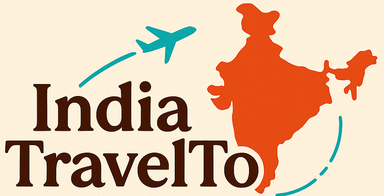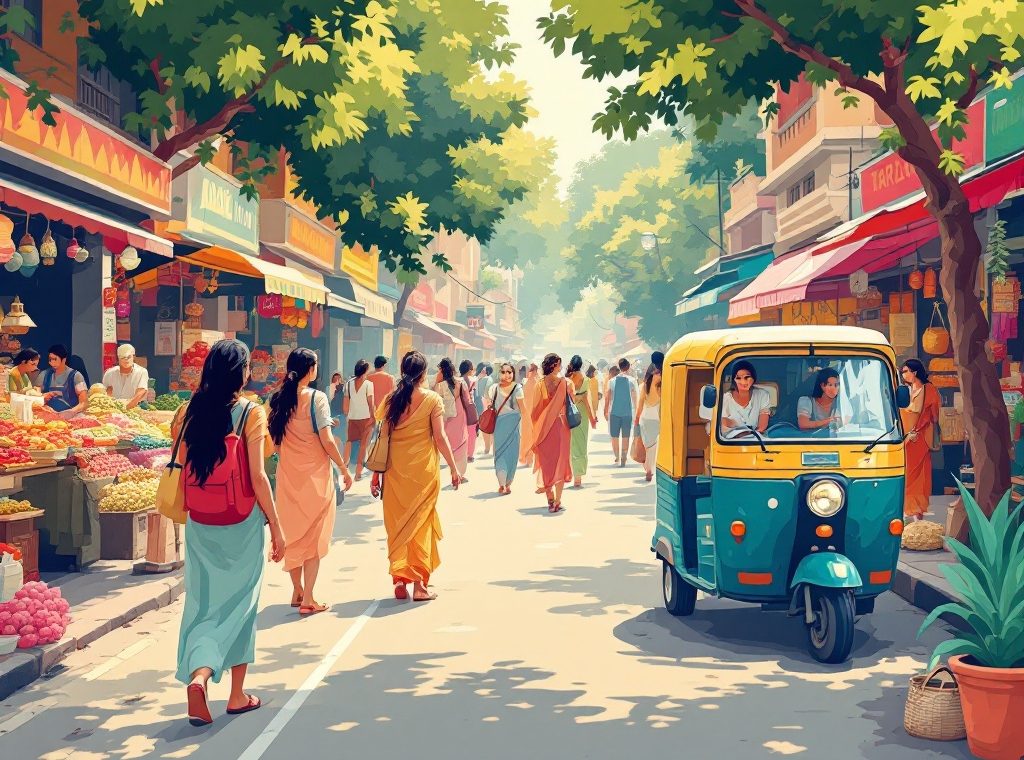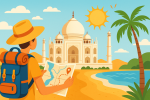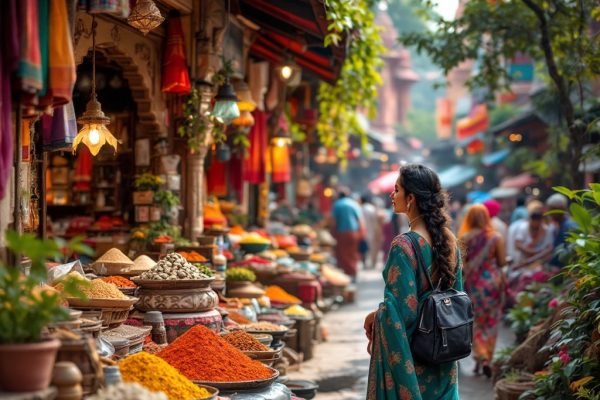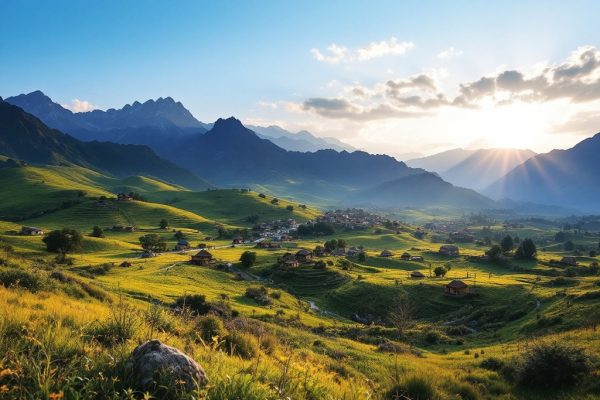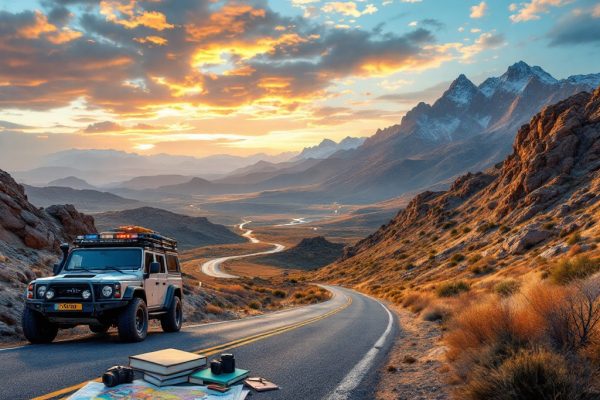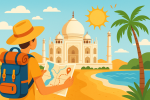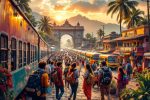Staying Safe in India: How to Travel with Confidence
Planning an unforgettable trip to India? Navigating safety concerns is key to a smooth adventure. From understanding regional risks like crime in Jammu and Kashmir to protecting yourself from petty theft, this guide provides essential safety tips for all travelers, especially women. Discover how to stay safe on public transport, respect local customs, and handle emergencies. Empower yourself with knowledge for a truly enriching and secure Indian experience. Read on to prepare for your journey!
Important information
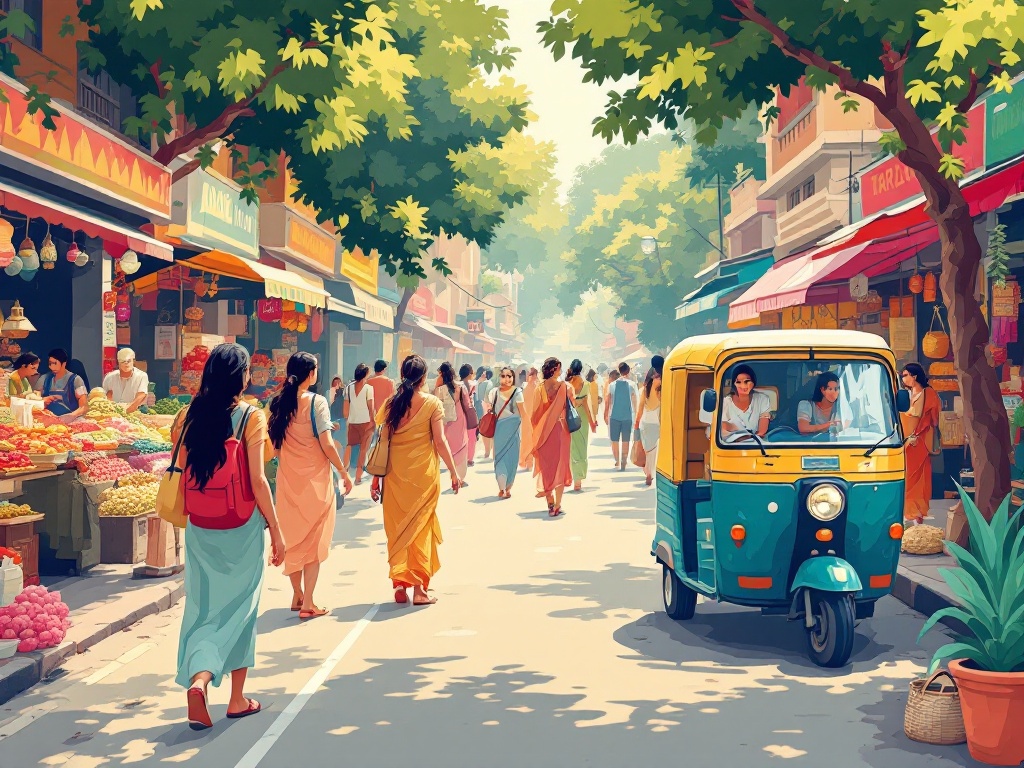
- Crime and terrorism are significant risks in India, especially in Jammu and Kashmir, which should be avoided.
- Be aware of your surroundings, secure your belongings, and respect local customs.
- Pre-book transportation, negotiate fares, and be vigilant on public transport and at transportation hubs.
- Consult your doctor about vaccinations and necessary medications, and pack a first-aid kit. Drink bottled water and consider travel insurance.
- Women travelers should share their itinerary, choose safe accommodations, avoid walking alone at night, and consider women-led tours.
Understanding Safety Concerns for Travelers in India
Traveling in India requires vigilance due to safety concerns. Crime and the threat of terrorism are significant risks, particularly in Jammu and Kashmir. This region should be avoided due to ongoing civil unrest. Sexual assault is a serious issue affecting both locals and tourists. Staying informed about current events and taking necessary precautions is crucial for a safe trip. Here are some safety guidelines for traveling in India:
Research your destination. Learn about the specific safety concerns and local laws of the areas you plan to visit.
Stay aware of your surroundings. Be vigilant in crowded places and avoid walking alone at night, especially in poorly lit areas.
Protect your belongings. Keep your valuables secure and be cautious of pickpockets, especially in tourist areas.
Respect local customs. Dress modestly, especially when visiting religious sites, and be mindful of local traditions.
Stay connected. Keep your phone charged and have a way to contact emergency services if needed.
Travel Advisories and High-Risk Areas
Jammu and Kashmir: Due to terrorism and civil unrest, Jammu and Kashmir is unsafe and should be avoided. Elsewhere in India: The risk of terrorist attacks is elevated, so heed local advisories and exercise caution. Stay informed about potential dangers to ensure your safety.
Personal Security and Crime Prevention
Stay vigilant on public transport and in crowded areas, as these locations are often targeted by pickpockets. Regularly review your security measures and maintain awareness of your surroundings, especially in busy environments.
Emergency Services and Contacts
If you’re a crime victim in India, dial 100 for immediate police help. For assistance during business hours, contact your tour leader or travel company. Local emergency services can also provide support. Before your trip, prepare a backup plan that includes:
- emergency contacts,
- nearby hospitals,
- your embassy or consulate’s location.
This preparation could be vital in a crisis.
Safe Travel Strategies for Women Travelers
Planning a safe trip to India as a woman involves understanding local customs. Traveling with companions is recommended. If solo travel is necessary, keep someone informed of your whereabouts. Share your itinerary with a trusted contact and check in regularly. Opt for reputable accommodations with robust security measures. Avoid walking alone at night, particularly in deserted areas. Exercise caution with food and beverages offered by strangers. Learning basic Hindi can enhance your experience. Projecting confidence can also deter unwanted attention. Dressing modestly, in line with local traditions, can minimize unwanted attention. Carry a personal safety alarm and be prepared to use it. Trust your intuition. If a situation feels unsafe, remove yourself. Keep your hotel informed of your plans.
Safety Recommendations for Solo Female Travelers in India
- Share your itinerary with a trusted contact and check in regularly.
- Choose reputable accommodations with strong security measures.
- Avoid walking alone at night, especially in deserted areas.
- Be cautious with food and drinks from strangers.
- Learn basic Hindi phrases for better communication.
- Project confidence to deter unwanted attention.
- Dress modestly, respecting local customs.
- Carry a personal safety alarm and be ready to use it.
- Trust your instincts and remove yourself from unsafe situations.
- Inform your hotel about your daily plans.
Enhanced Travel Experiences
- Consider women-led tours or community tourism initiatives for a supportive network and unique cultural immersion.
- Community tourism empowers local women and promotes sustainable development.
- These tours can be a safer and more enriching way to experience India.
- They offer opportunities you might otherwise miss and foster a deeper cultural understanding.
For accommodation, select safe, well-lit areas. Pre-booked transportation or reputable ride-sharing services are preferable to public transport. If using public transport, utilize women-only compartments where available. A local SIM card will simplify communication. Plan ahead, stay vigilant, and enjoy your Indian adventure.
Precautions for Solo Female Travelers
Whenever possible, especially at night, travel with a friend.
Avoid hailing taxis directly from the street; pre-book your rides instead or consider using local contacts you can rely on.
If traveling solo is unavoidable, inform someone trustworthy of your itinerary and maintain regular contact.
Pay attention to your surroundings and trust your instincts.
If a situation feels unsafe, remove yourself immediately.
Women-Led Tours and Community Tourism
Women-led tours offer a unique blend of safety and cultural immersion, respectfully connecting female travelers with local communities for authentic experiences. These tours support local initiatives, empowering women and promoting financial independence within these communities. Examples include learning about regional catering practices and participating in craft workshops. This makes women-guided tourism incredibly valuable.
Cultural Norms and Personal Safety
When visiting religious sites or rural areas, dress modestly out of respect for local customs and for your own safety. Covering your legs and shoulders is generally advisable. For swimming, wear shorts and a t-shirt over your swimsuit. Avoid public displays of affection. Overly friendly behavior with local men can be misinterpreted. Cultural sensitivity leads to more enriching travel experiences.
Respecting Local Dress and Customs
When traveling in India, modest attire demonstrates respect for local customs, particularly at religious sites or in more traditional regions. This practice not only honors cultural norms but also helps prevent unwanted attention. For example, covering your shoulders and legs is generally appropriate.
Connecting with Locals and Cultural Awareness
Learning basic Hindi phrases like “Namaste” (hello) and “Dhanyavaad” (thank you) significantly enriches your travel experience. Respectful engagement and understanding local customs are key to positive interactions. A simple head nod often substitutes for a handshake. Removing your shoes before entering temples or homes demonstrates respect. Always seek permission before photographing people or sacred spaces to show cultural sensitivity.
Immersing yourself in Indian culture can include:
- participating in local festivals,
- savoring new foods,
- engaging in conversations.
Supporting responsible tourism builds connections with local communities.
Consider joining a women-led tour for valuable insights and to empower local women, gaining a unique perspective on the region.
Transportation Safety Tips for Traveling with Confidence
Enhance your Indian adventure with these essential safety tips:
Consider pre-booking private cars or taxis for a more secure travel experience, especially if you’re unfamiliar with the local public transport system. Reputable ride-hailing apps are also a convenient and often safer alternative.
If you choose a taxi or auto-rickshaw, always negotiate the fare beforehand to avoid misunderstandings. Ensure the meter is running to prevent overcharging, or agree on a fixed price before starting your journey. When using public transport, particularly in crowded areas like stations and airports, be extra vigilant about pickpockets and keep your belongings secure.
Stay aware of your surroundings at all times for a safer and more enjoyable trip.
Trusted Transport and Pre-arranged Services
Pre-planning your transportation in India enhances your safety. Booking airport transfers and taxis ahead of time is a safer alternative to finding transport on arrival, protecting you from scams and inflated prices, especially late at night. Pre-booking offers several advantages: it ensures a reliable ride, minimizes the risk of encountering unscrupulous drivers, and allows you to compare prices and choose the best option. Booking in advance offers peace of mind, letting you start your trip relaxed and prepared.
Public Transport and Avoiding Pickpockets
When traveling on crowded buses and trains, safeguard your possessions by keeping valuables close and staying alert. Pickpockets often target distracted individuals, so vigilance is essential. Consider using an anti-theft bag or clothing with secure pockets for added protection.
Safety at Transportation Hubs
Train stations and airports, often bustling with activity, are prime locations for theft. Travelers must remain vigilant and keep their belongings close. A little preparation can significantly enhance the safety of your valuables and ensure a smoother trip. Here’s how:
Secure your luggage. Use TSA-approved locks for checked baggage and consider cable locks for backpacks and carry-ons.
Keep valuables close. Store essential items like passports, wallets, and phones in secure inner pockets or a money belt worn under your clothing.
Stay aware of your surroundings. Avoid distractions and be mindful of individuals who appear overly interested in your belongings. Don’t leave your bags unattended, even for a moment.
Be cautious of scams. Be wary of individuals offering unsolicited assistance or distractions. Report any suspicious activity to the authorities immediately.
Insure your valuables. Consider travel insurance that covers lost or stolen items for added peace of mind.
Travel Health Information and Weather Preparedness
Before your trip to India, consult your doctor about recommended vaccinations and medications. Pack a comprehensive first-aid kit.
Food and Water Safety
Prioritize your health by consuming bottled or purified water. Choose reputable establishments for your meals to minimize risks.
Travel Insurance
Travel insurance with comprehensive medical coverage is highly recommended for your trip to India.
Monsoon Season Awareness
Be aware of the monsoon season, which can bring heavy rains and potential flooding, possibly disrupting travel. Stay updated on weather forecasts and be prepared to adjust your itinerary.
Weather Safety
Your safety is paramount during any extreme weather events.
Health Precautions and Medical Preparedness
Before your trip to India, consult your doctor about recommended vaccinations and necessary medications. Pack a comprehensive first-aid kit with essentials like antiseptic wipes, pain relievers, and motion sickness medication. Be aware of local health risks, such as waterborne diseases, and take precautions like drinking bottled water. Travel insurance is recommended; ensure your policy covers medical emergencies and evacuations. Learning basic first-aid and identifying nearby medical facilities at your destination will further enhance your safety.
Consult your doctor. Discuss recommended vaccinations and necessary medications for your trip to India.
Pack a first-aid kit. Include essentials such as antiseptic wipes, pain relievers, and motion sickness medication.
Research local health risks. Be aware of waterborne diseases and take precautions like drinking bottled water.
Get travel insurance. Ensure your policy covers medical emergencies and evacuations.
Learn basic first-aid. Identify nearby medical facilities at your destination.
